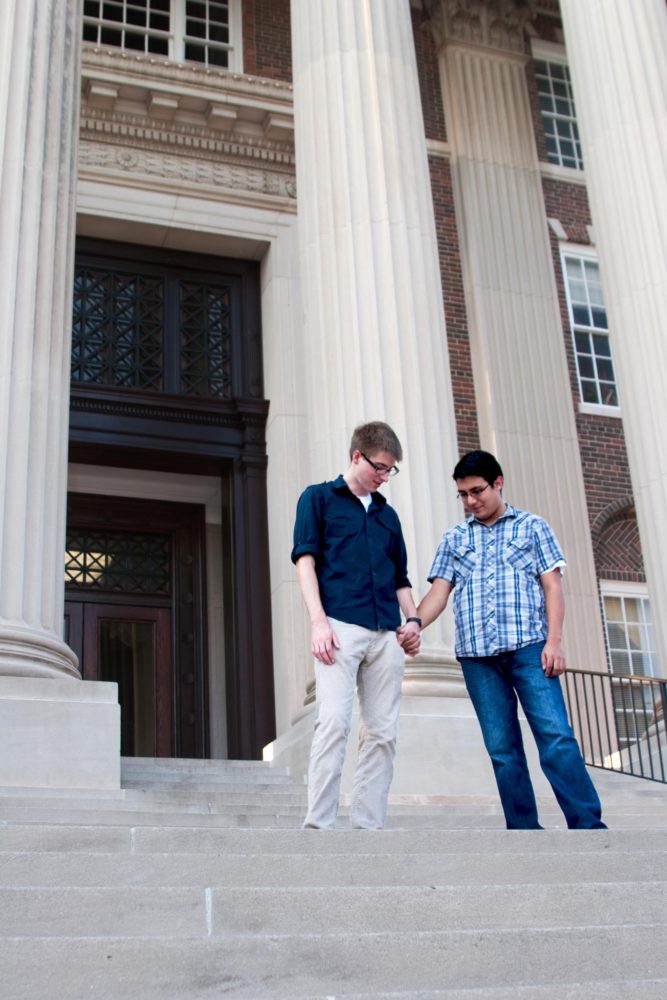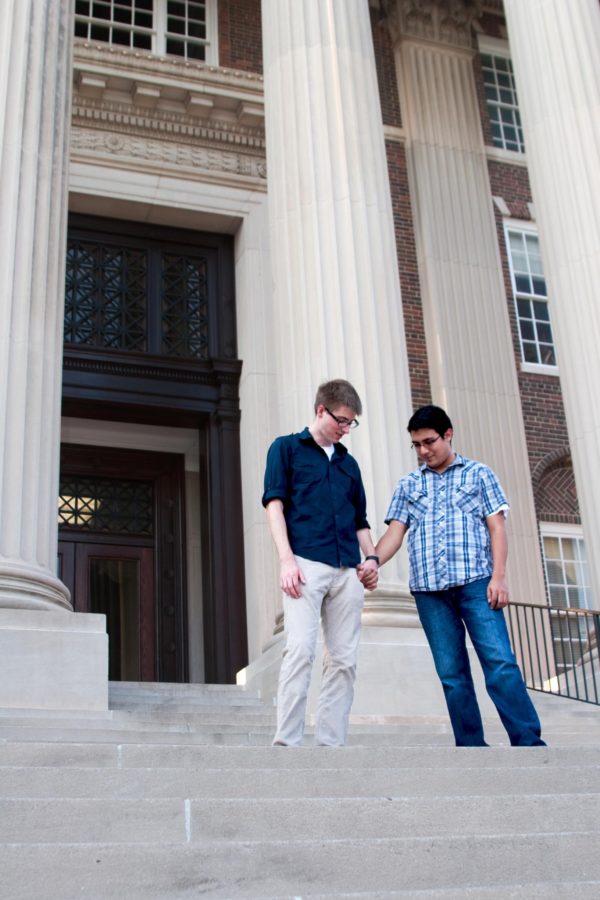
Sophomore Harvey Luna and junior Eric Douglas are members of Spectrum, an organization that helps students speak openly about their concerns and help partake in the stand for equality for the LGBT community. (Spencer J Eggers/The Daily Campus)
SMU was ranked the No.12 most “LGBT-unfriendly” campus in the country, according to a recent report from the Princeton Review. This number is up four spots, from No. 16, just a couple of years ago.
LGBT administration, faculty, students and allies at SMU feel as if the Princeton Review does not accurately portray the campus’ most recent developments.
Another concern is that people will take this report seriously, when in fact the Princeton Review bases this ranking on student’s responses to the LGBT community.
“I worry that people believe this review is valid,” David Chard, dean of the Simmons School of Education, said. “We don’t judge your [student’s] academic abilities on your grade in statistics.”
Meadows School of the Arts graduate admissions coordinator, Joe Hoselton, better known as Jenna Skyy in the LGBT community, finds the survey amusing.
“It’s humorous that it is given as much weight as it is given solely because it says ‘Princeton,'” he said. “The reality of one question is such a narrow scope, and it’s given such a powerful ranking blows me away that it would even be taken seriously.”
Baylor University, a Baptist school in Waco, Texas, did not make the list this year. In the last report from the Princeton Review, Baylor ranked at No. 11.
“It was shocking to see Baylor off the list when SMU has a non-discriminatory policy,” Harvey Luna, co-president of Spectrum, a LGBT organization at SMU, said.
Of the approximately 400 colleges included in the Princeton Review’s annual survey, SMU is one of the few schools included on the list that has a non-discrimination policy that protects members of the LGBT community.
“There are live-in domestic partner benefits through Residence Life and Student Housing,” ally of the LGBT community, Karen Click, who is also the director of the Women’s Center for Gender and Pride Initiatives, said. “The Lesbian, Gay and Bisexual communities are afforded protections in the university’s statement of non-discrimination.”
As a private university, SMU is one of the only colleges in Texas to uphold this policy.
“The Board of Trustees understood that if they wanted to recruit the best faculty, they needed to include sexual orientation in their anti- discrimination policy,” Chard said.
While the Princeton Review ranks SMU as one of the most “homophobic” colleges in the country, the Campus Pride review gave SMU four out of five stars for LGBT acceptance.
One factor that may influence the results of each review is that the Princeton Review is sent to students while Campus Pride is sent to administration.
“Campus Pride is one of the best surveys to determine which campus is truly LGBT friendly,” Luna said. “The Princeton Review is misleading.”
Click said that “most areas on campus are doing great work,” and Campus Pride recognized that.
“It provided us with feedback on what areas need to be explored further,” she said. “It’s just a matter of fine-tuning our roles.”
LGBT students appreciate the improvements made on campus.
“SMU is progressive and it makes us feel welcome,” Michael Graves, SMU sophomore, said.
Location
Texas is the only state with three schools on the list, two of which are in Dallas ⎯ SMU and the University of Dallas, which ranked No. 9. Texas A&M ranked No. 10.
Many members of the LGBT community at SMU believe SMU’s location affected the rankings in the Princeton Review.
With multiple organizations and events at SMU, Click finds campus to be LGBT friendly. However, she realizes SMU is “not a bubble.”
“We are reflective of the environment in which we are located,” she said ” Of course there is homophobia here. However, the difference at SMU is the support provided in acknowledgment in that.”
“We live in the part of the country that has been historically socially conservative,” Chard said. “Many people grow up in communities where they do not get to interact openly with gay or lesbian students.”
For many of SMU students, college is the first time when they meet members of the LGBT community. Or, college is the first time students are open about their sexual orientation.
“Often times when things are unfamiliar to us, we don’t know how to accept them,” Chard said.
President of College Republicans Chad Cohen believes SMU’s reputation, as a “homophobic” school, is a direct impact of being in Texas, specifically situated in Highland Park.
“We are a southern school in Texas,” he said. “SMU has struggled with this forever.”
Cohen believes, however, that SMU as a community is “making an effort to fix this problem.”
And, many members of the LGBT community would agree.
“SMU is one of the top universities in the nation. Regardless of sexuality, we are here for an education and an unforgettable four-year experience,” Mark Agnew, SMU senior, said. “Socially I have thrived and made great friends all over campus. Being gay is not something I talk openly about. It is simply another layer of my identity.”
Senate
Last semester Student Senate voted on two pieces of legislation tailored to the LGBT community. Luna, a Dedman 1 Senator last year and co-president of Spectrum, helped author both bills.
One bill, a resolution to denounce homophobia, passed while the other, a special interest seat in Senate, did not.
When the special interest seat failed, many Senators and students on campus were shocked.
Student Senate has been working with the LGBT community to establish a special interest seat, or some form of representation, for a few semesters.
“People were very clear that it is not about homosexuality,” Katie Perkins, one of th
e authors of the bills and last years student body secretary, said. “It was the practicality of the matter. No one said it was because they didn’t believe in gay rights.”
According to Perkins, many of the Senators last year could not vote in favor of the bill because accurate numbers were not presented.
Although Dedman 1 Sen. Christoph Schmidt voted “nay” last year, he still supports the LGBT community at SMU.
“The bottom-line is that the university is made up of individuals, who have to make their own decisions regarding their views of the LGBT community,” he said. “While organizations, such as Spectrum, are doing their part to raise awareness, as society on the whole progresses and people become more accepting of the LGBT community, so will SMU.”
Dr. Sean Griffin, the chair of division of film and media arts, thinks that there are various signposts that lead people to think that SMU is unfriendly. And, the special interest seat failing is one of them.
“The fact that it didn’t get passed could easily be read as how unfriendly we are,” he said. “It’s still an issue that needs to be talked about.”
Organizations and Events
Despite SMU’s bad ranking by the Princeton Review, the school has many LGBT groups on campus as well as partnerships in the Dallas community.
There is one undergraduate group, Spectrum; two graduate programs, one in the law school and the other in the business school; and, the fourth is in Perkins School of Theology.
Spectrum, which began in the 1980s, is broadening its focus this year.
“We want to focus on programs that include bisexual identities with weekly meetings to discuss a wide range of topics,” Samuel Partida, co-president of Spectrum, said.
Partida believes one of the main issues at SMU is that LGBT groups concentrate on gay and lesbian students and often disregard students struggling with their identities and bisexual or transgender students.
Aside from the changes Spectrum is making, other groups are expanding its programs and the campus as a whole is engaging with the greater-Dallas area.
The Women’s Center for Gender and Pride Initiatives is “launching a new LGBT Staff and Faculty group,” this year according to Click.
SMU sponsors the Black Tie Dinner, the largest gay and lesbian fund raising charity in the country, and the Simmons School of Education’s counseling program has an internship partnership with Resource Center of Dallas.
“They are great relationships for us,” Chard said.
Though SMU has been proactive, there is still a lot of work to be done.
“Students in the university are the right age to be discussing, talking about bulling and cyber-bulling,” Chard said.
This fall, Simmons School of Education is hosting two events to talk about bullying.
But while there are strides being made and students are more comfortable with members of the LGBT community, “students don’t take the chance to stand out of the stereotype,” according to Hoselton.
“Stereotypes grow out of a grain of truth,” Chard said. “We are in a society in transition around this topic and we can’t measure the climate of a campus with one question.”









